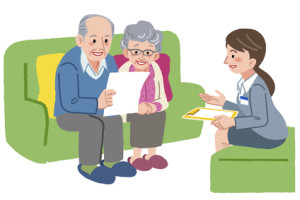Falls are the leading cause of fatal and non-fatal injuries in older adults. For this reason, a fall risk assessment and home safety evaluation is vital. Falls can not only be deadly to elders, they can forever alter quality of life since falls often lead to nursing home placement and declining health. A professional fall risk assessment is a valuable tool in preventing falls and the accompanying problems. Below we will outline what is involved and how your family can benefit from a fall risk assessment and home safety evaluation, along with sharing falls prevention resources.
When should our family consider a professional fall risk assessment and home safety evaluation?
- As your parents age, their fall risk increases. A home safety evaluation is wise for anyone over the age of 70 and especially those with health problems.
- If your Mom or Dad has ever fallen before, it is vital to ensure the home environment is as risk-free as possible.
- If your elderly parent takes medications or has any chronic conditions, it is wise to get a comprehensive assessment.
- If your aging parents desire to “age in place” at home, a fall risk assessment is one of the best ways to ensure this is possible.
- When your elderly loved one leaves the hospital or has a change in health, it may be wise to review the health and living situation for continued safety.
What is involved in a professional fall risk assessment?
- Review of the client’s health status (diagnoses, medications, history) and possible risks.
- Assessment of ADLs and IADLs for potential trouble areas and resources to assist.
- Home safety evaluation: a thorough review of the home environment to identify fall risks and ways to improve aging-in-place readiness. For some ideas of key areas of the home, check out EasyLiving’s Fall Prevention Checklist (free for you to download to get an idea if your parents’ home may have safety issues).
- The geriatric care manager writes up their findings and recommendations and reviews this with your family.
- A geriatric care manager’s assessment is more than just identifying the risks; it comes with personalized recommendations for solutions. So, rather than just saying “the throw rugs are dangerous”, the care manager might offer solutions if the client has a special attachment to the rugs, like non-slip backings or hanging them as wall decoration. For the bathroom, the care manager might recommend someone to install grab bars and provide specific equipment or modification suggestions. Often, the creative solutions make life easier as well as safer. For example, our care manager helped one client rearrange items in the kitchen so key items were within reach and sight. She ended up wasting less food, finding the kitchen more user-friendly and avoided getting on step stools to find items regularly.
How do I approach my elderly parents about a fall risk assessment?
- Take the approach that this is a step to make sure their wishes (such as the desire to remain at home) can be met.
- Explain that the process is collaborative. The geriatric care manager will make suggestions and can offer alternatives if they don’t like some of the solutions (such as the above throw rug example).
- Talk to the care management company about their suggestions if your parents are reluctant. Our care managers are highly experienced working with reluctant clients and often have great success once the clients meet them (daughters and sons frequently tell us they can’t believe Mom agreed to make changes they had been suggesting over and over!).
Resources:
Home, Sweet Home: Aging in Place Tips
Contact us about a fall risk assessment and home safety evaluation.
Get our free monthly newsletter with ongoing tips and new resources!

 Popular Downloads
Popular Downloads


 Get Our Newsletter!
Get Our Newsletter! Mission Statement
Mission Statement

